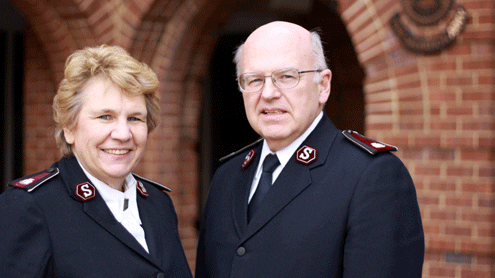inProcess
by Glen Doss, Major –
In Process column
Doss
May 19, 2009
Full surrender to God doesn’t happen this side of glory; we are not “made perfect” in this lifetime. Nevertheless, the joy of the ongoing journey of surrender is almost intoxicating—it makes the journey well worthwhile.
Full surrender doesn’t occur in this lifetime because, being human, we are unaware of many of the character defects blocking us from an all-embracing relationship with God. We must uncover and own them in order to get rid of them, for we cannot surrender something we do not own. Since life goes on, and our sinful nature follows, the surrender is unceasing.
When we come to trust in Jesus, we surrender to Christ all of ourselves we can. Yet as we grow in faith, we find previously hidden portions of ourselves, areas of sin, we were unaware of. As the Holy Spirit reveals them, as one peels an onion layer by layer, we must surrender them as well. This is not a surrender of the external life, such as: “I will not use profanity anymore,” or “I will not gossip anymore.” It is a surrender of the will itself—our desires, our choices. It is never accomplished through mere decision. Self-will cannot defeat self-will. Such a thing would be as futile as willing myself to be 10 inches taller or 10 pounds lighter: it would be a fruitless Romans 7 experience.
The solution lies in leaning on Jesus as he leads on to victory as indicated in Romans 8. When in the course of my journey, the Holy Spirit brings to my attention an area of my life I have not surrendered, it is my responsibility to say “no” to my personal preferences and reach out to God through the disciplines of confession and repentance, and this will lead to new action.
Our first inclination when seeking to repent is to do so on will power alone. It is a tendency to try to change oneself. But when we confess our sin, and give up the right to ourselves, God will help us let go of the attachment to the sin. This is the crucial step of repentance, for it is the attachment itself that presents the barrier between God and us
“Continue to work out your salvation with fear and trembling,” writes Paul, “for it is God who works in you to will and to act according to his good purpose” (Philippians 2:12-13 NIV).
As we exercise godly sorrow for our sin, the Holy Spirit guides us along the path that leads to transformation of our will. No longer obsessed with the sinful pleasure, our minds are “set on what the Spirit desires” (Romans 8:5 NIV). God has delivered us.
The only route to humility is application of the spiritual disciplines of self-examination, confession and repentance. Psalm 25:9 tells us that it is the humble person who has the ear of God. Since Moses may hold the all-time record for lengthy conversations with God, it is no surprise that “Moses was a very humble man, more humble than anyone else on the face of the earth” (Numbers 2:3 NIV).
Webster’s New World Dictionary defines the humble person as one “having or showing a consciousness of one’s defects or shortcomings.” Surely it follows that we should be proactive in searching out what those defects and shortcomings are. This requires serious effort, self-examination, and an ongoing surrender to God. “If anyone thinks he is something when he is nothing, he deceives himself. Each one should test his own actions” (Galatians 5:3-4 NIV).
James 4:6-10 says: “God opposes the proud but gives grace to the humble. Submit yourselves, then, to God. Resist the devil, and he will flee from you. Come near to God and he will come near to you…Humble yourselves before the Lord, and he will lift you up.”
The ongoing journey of surrender takes a lifetime, but it ends in glory!












